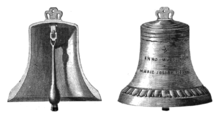Rudhall of Gloucester
Rudhall of Gloucester was a family business of bell founders in the city of Gloucester, England, who between 1684 and 1835 produced over 5,000 bells.[1][2]
History
There had been a tradition of bell casting in Gloucester since before the 14th century.[3][4]
The family business was founded by Abraham Rudhall (1657–1736) who developed a method of tuning bells by turning rather than the traditional chipping method.[5]
Some of the earliest ring of bells he cast was for St Nicholas' Church, Oddington in 1684.[6] He came to be described as the greatest bell-founder of his age. The business was continued by his eldest son, also called Abraham (1680–1735), his son Abel (1714–60), and three of Abel's sons, Thomas (?1740–83), Charles (1746–1815) and John (1760–1835).[6] In 1815 John Rudhall was declared bankrupt and the bell foundry bought by Mears & Stainbank who owned the Whitechapel Bell Foundry.[7] The business formally closed in 1828 but bells bearing John's name have been found with dates up to 1835.[8]
Selected bells
Several bells at Great Malvern Priory were cast by Rudhalls in the early 18th century.[9]
Adlestrop where 4 bells cast by Abraham Rudhall in 1711 hang - unfortunately the bells are classified as unringable due to the poor state of the bell supports.[10]
Six of the bells in Pershore Abbey were cast in 1729 by Abraham Rudhall.[11]
Eight change ringing bells (tenor: 13 long cwt 3 qr 5 lb (1,545 lb or 701 kg) in F) at Old North Church in Boston were cast by Rudhalls in 1744 and hung in 1745.[12] One bell has the inscription: "We are the first ring of bells cast for the British Empire in North America, A.R. 1744." Five bells cast by Abel Rudhall in 1757 still hang in Wells Cathedral.[13]
Six bells, cast in 1714 by Abraham Rudhall, still hang at the Church of St Leonard, Middleton, Greater Manchester.[14]
In 2012 two redundant bells from St Michael and St Wulfad's church in Stone were relocated to St Michael's tower in Gloucester, close to the site where they were made.[15]
References
- ↑ The Rudhall Family I, Gloucester City Council, archived from the original on 8 February 2012, retrieved 14 September 2013
- ↑ "Rudhall Bells" (PDF). Discover DeCrypt. Retrieved 29 August 2016.
- ↑ Rudge, Thomas (1811). The History and Antiquities of Gloucester: From the Earliest Period to the Present Time; Including an Account of the Abbey, Cathedral, and Other Religious Houses, with the Abbots, Bishops, and Dignitaries of Each. J. Wood. p. 120.
- ↑ "The Origins of Gloucester Bell Founding". Gloucester Made. Archived from the original on 8 February 2012. Retrieved 29 August 2016.
- ↑ Counsel, George Worrall (1829). The history and description of the city of Gloucester: from the earliest period to the present time ; with an account of St. Peter's Abbey, the cathedral, churches, and other religious houses ; ...the origin and present state of the port of Gloucester ; the Gloucester and Berkeley Canal... J. Bulgin. p. 218.
- 1 2 Bliss, Mary (2003). "The Last Years of John Rudhall, Bellfounder of Gloucester, 1828- 35" (PDF). Transactions of the Bristol and Gloucestershire Archaeological Society. 121: 11–22.
- ↑ "Bells for America". Gloucester Made. Archived from the original on 8 February 2012. Retrieved 29 August 2016.
- ↑ Middleton, L. M.; Hudson, Giles (rev.) (2010) [2004], "Abraham Rudhall the elder", Oxford Dictionary of National Biography, Oxford University Press, retrieved 14 September 2013 ((subscription or UK public library membership required))
- ↑ "The Priory Bells". Great Malvern Priory. Retrieved 29 August 2016.
- ↑ Bagley, David P. "A Ringers Guide to Towers in Gloucestershire". David Bagley.
- ↑ "Pershore Bells and the Pershore Abbey Society of Bell Ringers". Pershire Abbey. Retrieved 29 August 2016.
- ↑ "Boston, Old North Christ Church". Dove's Guide for Church Bell Ringers. Retrieved 29 August 2016.
- ↑ "Great bells of GB" (Excel). The Keltek Trust.
- ↑ "History". St Leonard's Church. Retrieved 29 August 2016.
- ↑ "Stone church bells 'going home' to heritage centre". BBC. Retrieved 29 August 2016.
